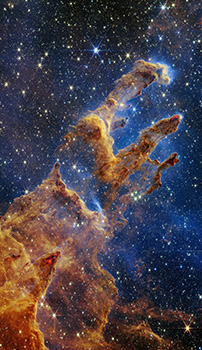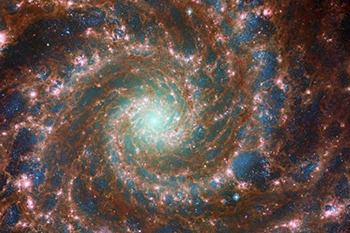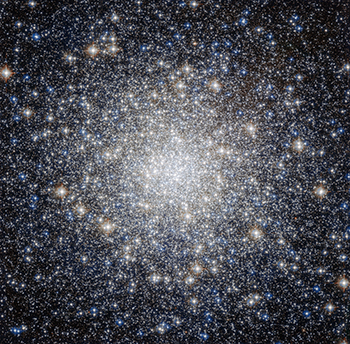From Our Archives
Debie Thomas, Greatly Perplexed (2021); Debie Thomas, Bearable Stories (2018); Dan Clendenin, Amos or Amaziah? (2015).
For Sunday July 14, 2024
Lectionary Readings (Revised Common Lectionary, Year B)
Psalm 24 or Psalm 85:8–13
Ephesians 1:3–14
Mark 6:14–29
This Week's Essay
Ephesians 1:23, the fullness of God who fills everything in every way
The earth is the Lord's, and all it contains, the world, and those who dwell in it.
These simple words from Psalm 24 express the profound belief that all creation is kept by the love of God. There's absolutely nothing that lies outside of God's love, nor could it. In the cosmology of the psalmist, Divine Love encompasses all time, all space, all things, and all people. Psalm 89:11 uses nearly identical language: "the heavens are thine, the earth also is thine, the world and all it contains."
Despite their differences — some real and some imaginary, science and Christianity agree on at least one fundamental point: that space and time had a Beginning, and that they will come to a definitive End. The devil is in the details, of course, and when it comes to those details, faith and science offer different stories about the meaning of our Beginning and End.
For scientists and most believers, the Beginning started with the Big Bang about 15 billion years ago. As for the End, about 5 billion years from now, the sun will expand into a red giant 10,000,000 times its present volume and incinerate the earth. "It is as sure as can be," writes the particle physicist and Anglican priest John Polkinghorne, "that humanity, and all forms of carbon-based life, will prove a transient episode in the history of the cosmos."
But the End of our little earth is small beer compared to the End of the entire universe. My friend and solar physicist Charles tells me that physicists are divided about the future of the cosmos, but equally bleak. If the expansion of the Big Bang continues to propel everything outward, our galaxies will fly apart forever, although individual galaxies will collapse into black holes. But if the forces of gravity prevail, the universe will eventually reverse its expansion and collapse into a Big Crunch.
 |
|
Pillars of Creation by the James Webb Telescope.
|
In his book The Language God Talks; On Science and Religion (2010), the Jewish novelist Herman Wouk (1915–2019) asked whether this story told by science alone is adequate or satisfying. When he was researching his books The Winds of War (1971) and War and Remembrance (1978), Wouk met with the famous Caltech physicist Richard Feynman. "Do you know calculus?" Feynman asked Wouk. "You had better learn it," said Feynman, "it's the language God talks." Wouk never did learn calculus, but he later had two more conversations with Feynman at the Aspen Institute.
Wouk ruminated about those conversations long and hard, and in particular about an off-the-cuff remark that Feynman made in a television interview that later became a famous sound bite. In the interview, Feynman said that "it doesn't seem to me that this fantastically marvelous universe, this tremendous range of time and space and different kinds of animals, and all the different planets, and all these atoms with all their motions, and so on, all this complicated thing can merely be a stage so that God can watch human beings struggle for good and evil — which is the view that religion has. The stage is too big for the drama."
No, Wouk objected, the stage is not too big for the actors. He might not have learned calculus, he said, but he did know God's "other language" in the Talmud. Has the last 15 billion years really been such a "vastly drawn-out complex purposeless nonsense?" asked Wouk. "I'll venture that not even a solid savant like Steven Weinberg can believe that, not in his innermost soul."
Art, human joy and sorrow, the mystery of human consciousness, the beauty and terror we experience in creation, all these hints do not "prove" anything, but they nevertheless suggest that our human drama does indeed have an overall Plot and Author. There is also the miracle that our vast cosmos is comprehensible.
However overwhelming the cosmos feels, says the theoretical physicist and Nobel Laureate Frank Wilczek, we shouldn't give in to "cosmic sizeism," for we human beings are big in our unique way. We're "big enough to contain the outer universe in our minds," says Wilczek. Pascal similarly confessed that although the cosmos "swallows me like a speck, through thought I grasp it."
What is implicit in Psalm 24 becomes explicit in Ephesians for this week. Paul stretches and strains the limits of language to affirm the exceeding greatness of God's power that is equaled only by the breadth and depth of his love for all creation.
 |
|
The Phantom Galaxy by the James Webb and Hubble telescopes.
|
I don't remember most of the Greek that I learned in seminary, but I do remember that in the original Greek New Testament Ephesians 1:3–14 is one long, ponderous sentence that piles clause upon clause. Mrs. Tilley, my ninth grade English teacher, would have given Paul a failing grade for a run-on sentence. Different translations of the Bible struggle to punctuate Paul's syntax. But beyond his tortured prose, Paul connects creation and redemption.
Whereas the gospel of John and the book of Genesis both start with "in the beginning," Paul imagines a scenario "before the creation of the world" (1:4). Although this sounds like science fiction, I take his words at face value. It's an irresistible question for science and faith alike. The universe is about 15 billion years old, and even though that's an unimaginably large number, it's still a finite number.
What came "before" the beginning of space and time? Divine love did. And when in the distant but certain future the universe flies apart from a continued expansion of the Big Bang, or collapses into a Big Crunch from the forces of gravity, what comes "after" the end? Divine love does.
Paul says that the chronological march of clocks and calendars is going somewhere rather than nowhere. He says that time itself is progressing toward a "fulfillment." He tells the Ephesians that the "mystery of God's will," hidden in eternity past, is revealed in the first century Jesus. All creation will receive its redemption when God "brings all things in heaven and on earth together under one head, even Christ." Out of his own fullness God will both fill and fulfill "everything in every way."
This future redemption of the entire cosmos is so central to Paul's thought that he repeats these ideas almost verbatim in four additional epistles besides Ephesians. It's like he had a computer and did a cut-and-paste of his thoughts to five different churches.
 |
|
Hubble Space Telescope, the globular star cluster Messier 92 (M92).
|
The ultimate destiny of all creation is liberation and freedom, adoption and redemption. The scale and scope of this future hope encompasses "the whole creation" (Romans 8:12–25; cf. 1 John 2:2). God "created all things in heaven and on earth" (Colossians 1:16). He seeks the worship of all "things in heaven, and things in earth, and things under the earth" (Philippians 2:9–11). He will "reconcile to himself all things, whether things on earth or things in heaven" (Colossians 1:20). God will sum up or bring together "all things in heaven and on earth" (Ephesians 1:10). He delights in bestowing his fatherly favor on "the whole human family in heaven and on earth" (Ephesians 3:15). Paul's incremental logic is palpable — redemption is the destiny of each person, every nation, all creation, and the whole cosmos — not only on earth, but "under the earth and in heaven."
God was in Christ, says Paul, "reconciling the cosmos to himself" (2 Corinthians 5:19). The creation of Genesis will meet its redemption in Jesus. This is an affirmation of religious faith, of course, and not an assertion of scientific fact. But as Wouk reminds us, scientific facts alone do not always make for a completely satisfying story.
Psalm 24 and Ephesians 1:3–14 for this week have reminded me of a favorite hymn that was written by the Presbyterian pastor Maltbie Babcock and set to music by his close friend Franklin Sheppard. When Babcock lived in New York, he enjoyed walking along the Niagara Escarpment with its panoramic views. He would tell his wife Katherine that he was "going out to see the Father's world." His famous hymn was published posthumously in 1901.
This is my Father's world,
And to my listening ears
All nature sings, and round me rings
The music of the spheres.This is my Father's world:
I rest me in the thought
Of rocks and trees, of skies and seas;
His hand the wonders wrought.This is my Father's world,
The birds their carols raise,
The morning light, the lily white,
Declare their maker's praise.This is my Father's world,
He shines in all that's fair;
In the rustling grass I hear Him pass;
He speaks to me everywhere.This is my Father's world.
O let me ne'er forget
That though the wrong seems oft so strong,
God is the ruler yet.This is my Father's world:
why should my heart be sad?
The Lord is King; let the heavens ring!
God reigns; let the earth be glad!
Weekly Prayer
e.e. cummings (1894–1962)
i thank You God for most this amazing
day:for the leaping greenly spirits of trees
and a blue true dream of sky;and for everything
which is natural which is infinite which is yes(i who have died am alive again today,
and this is the sun's birthday;this is the birth
day of life and love and wings:and of the gay
great happening illimitably earth)how should tasting touching hearing seeing
breathing any—lifted from the no
of all nothing—human merely being
doubt unimaginable You?(now the ears of my ears awake and
now the eyes of my eyes are opened)
Dan Clendenin: dan@journeywithjesus.net
Image credits: (1) ESA/Webb; (2) Al Jazeera; and (3) NASA.





